Turkey Says Does Not Need Permission To Attack Syria
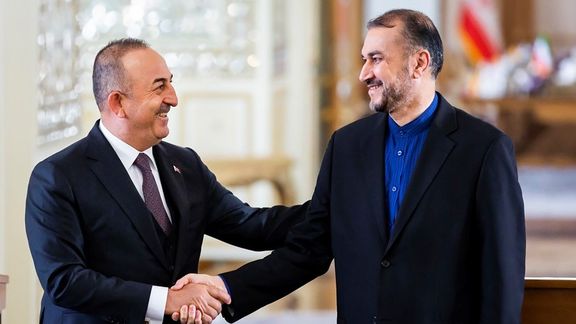
Turkey said Thursday it does not need anyone's permission to attack terrorist groups in Syria, despite Iran’s explicit opposition to any military incursion.

Turkey said Thursday it does not need anyone's permission to attack terrorist groups in Syria, despite Iran’s explicit opposition to any military incursion.
Two days after Turkish President Recep Tayyip Erdogan’s summit in Tehran with his Russian and Iranian counterparts during which both Moscow and Tehran urged Turkey against a new military operation in northern Syria, Mevlüt Çavuşoğlu said, "We exchanged ideas, but we never asked and we never ask permission for our military operations."
Iran’s Supreme Leader Ali Khamenei told Erdogan that a new Turkish offensive would be “detrimental” to the region.
Highlighting Turkey’s disagreements with Iran and Russia over Syria, Çavuşoğlu said the two countries' support for the Syrian regime is unacceptable to Turkey. “What we say is important, what our president says is important," Çavuşoğlu said.
He said Turkey had paused operations against the YPG/PKK in the east of the Euphrates because both the US and Russia had committed to clear them from this region, adding that “Since this has not happened so far, these terrorists have started to increase attacks against our own lands from there, as well as continuing the attacks against the Syrians, the opposition, our soldiers, and our police. What would the US do in such a situation now? What would Russia do?"
Turkey refuted Iraqi claims Wednesday that it had attacked a mountain resort in Zakho in northern Dohuk province, killing eight and wounding another 23 people.
Turkey regularly carries out air strikes in northern Iraq and has sent commandos to support its offensives as part of a long-running campaign against outlawed Kurdistan Workers Party (PKK) and the Syrian Kurdish YPG militias. Ankara regards both as terrorist groups.
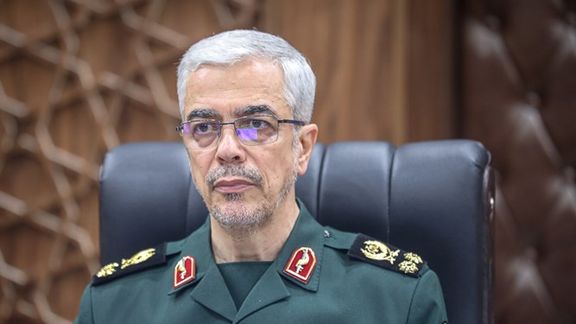
China is a strong power and Russia has ended its decline, weakening “American hegemony”, the chief of staff of Iranian armed forces told officers on Thursday.
Major Gen. Mohammad Bagheri, a Revolutionary Guard officer, was speaking in Mashhad in northwestern Iran, two days after the visit of Russia’s Vladimir Putin to Tehran, during which Supreme Leader Ali Khamenei endorsed his invasion of Ukraine, calling it a “praiseworthy initiative.”
The United States has warned that Russia is trying to procure military drones from Iran to use in Ukraine, although Tehran has offered a half-hearted denial.
Bagheri said that the United States’ expenditure of “ten trillion dollars in West Asia” was fruitless and US power is on decline, as the world has entered “a new transition period.”
The top military commander’s remarks were yet another sign of a clear tilt in Tehran toward a policy of relying on Russia and China to defy the West. After almost 16 months of talks to revive the 2015 nuclear deal, negotiations remain stalled.
Tehran, which is able to export more than 700,000 barrels of crude per day, despite US sanctions, is apparently counting on high oil prices and a rapidly expanding nuclear program to create a new reality.
President Joe Biden in his recent trip to the region pledged with Israel and Saudi Arabia never to allow Iran to produce nuclear weapons, but he still insists on following the diplomatic path to reach an agreement to revive the Joint Comprehensive Plan of Action or JCPOA and to put Iran’s nuclear program “in a box.”
However, his administration relaxed enforcement of US ‘maximum pressure’ sanctions imposed by former President Donald Trump as it embarked on the diplomatic path in early 2021. China taking advantage of the reprieve found illicit ways to increase oil imports from Iran.
Bagheri claimed that Iran used “the superiority of opportunities to threats” to gradually destroy the “foundations of [US] maximum pressure.”
He also highlighted that Iran defeated “enemy plots” near its borders to create threats against the Islamic Republic. Tehran uses the term ‘enemy’ primarily to point at the United States, and often also at its allies, Israel and Saudi Arabia.
However, numerous attacks on Iranian nuclear and military installations and assassinations of key nuclear and military figures since mid-2020 point to a high degree of infiltration by what many believe is the Israeli Mossad. Tehran made significant personnel changes in its intelligence and counter-intelligence networks in June, after a high-profile assassination and other unexplained deaths among IRGC figures in May and June.
Nevertheless, Bagheri emphasized that the top priority of the armed forces to is establish deterrence. He told commanders of IRGC ground forces gathered in Mashhad that their job was important “as the fate of battles is decided on the ground, especially for a country that has no aggressive intentions and simply wants to defend security on its territory, although even in a foreign conflict, it is still ground forces that decide the final outcome.” He told the officers that “Your job is to prepare for an unequal battle with a superior foreign enemy, to fight terrorists and anti-revolutionaries…”
IRGC forces have been extensively used to suppress popular protests since 2017, with the most brutal crackdown in November 2019 when at least 1,500 protesters were killed.
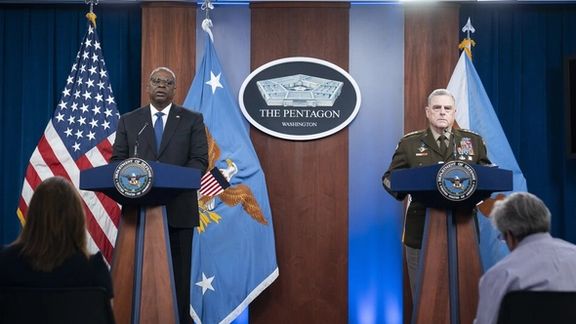
US defense officials said in a briefing on Wednesday that it is not a good idea for Iran to provide military drones to Russia, without elaborating further.
Secretary of Defense Lloyd Austin and Chairman of the Joint Chiefs of Staff Gen Mike Milley speaking extensively on the war in Ukraine responded to questions about US accusations that Russia is planning to obtain Iranian drones to strengthen its weakening position in battles.
Austin responding to a question said, “on the issue of Iranian support to Russia, we would -- we would advise Iran to not -- to not do that. We think it's a really, really bad idea. And I'll leave that at that.” Gen Milley refused to expand on Austin's remarks "at the microphone."
Last week, US National Security Adviser Jake Sullivan twice warned that Moscow appears to be looking at buying Iranian drones and Russian officers even visited a drone base in Iran’s Kashan to review their options. His statements hinted at possible training of Russian crews to operate the drones and said the this would cause more civilian deaths in Ukraine.
Meanwhile, the head of US Central Intelligence Agency, William Burns said Wednesday, “It’s true that the Russians are reaching out to the Iranians to try to acquire armed drones,” Bloomberg reported.

“They need each other, they don’t really trust each other, in the sense that they’re energy rivals and historical competitors,” Burns said. “It’s important to remind ourselves that it’s a reflection, in some ways, of the deficiencies of Russia’s defense industry today, and the difficulties they’re having after significant losses so far in the war against Ukraine,” Burns added.
Iranian officials have responded by reiterating Tehran’s position of neutrality in the war and that Iran would not supply military hardware to any of the sides, but there was never a clear denial of the American accusation. On the contrary, Iranians insisted that Tehran and Moscow have long-running military cooperation.
Iran’s ambiguous position became clearer this week, as Russia’s Vladimir Putin visited Tehran on Tuesday and met Supreme Leader Ali Khamenei, who described Russia’s attack on Ukraine as Mr. Putin’s praiseworthy “initiative” to counter what he described as “an inevitable” NATO military intervention.
On Wednesday, Iran’s foreign ministry spokesman Nasser Kanaani responding to a question on the drone issue, said “Iranian and Russian technological cooperation predates developments in Ukraine. Any linkage between our cooperation with Russia with developments in Ukraine is intentionally biased.”
Instead of denying the US accusation, Kanaani indirectly hinted at military cooperation with Russia even in drone technology.
It is entirely possible that Iran would help Russia to produce some of its drones with slightly different material and then claim the UAVs are not Iranian. To a large extent, Tehran has done just that with Houthis in Yemen, but it will not be difficult to determine that the weapons are copies of Iranian UAVs. However, given the fact that Russia is pressed for time by the highly accurate Western weapons provided to Ukraine, it will outright acquire and use Iranian drones.
Tehran that has delayed an agreement with the United States to restore the 2015 nuclear agreement ditched by President Donald Trump, seems increasingly confident that with high oil prices it can continue to expand its nuclear program and develop a new anti-West front with Moscow.
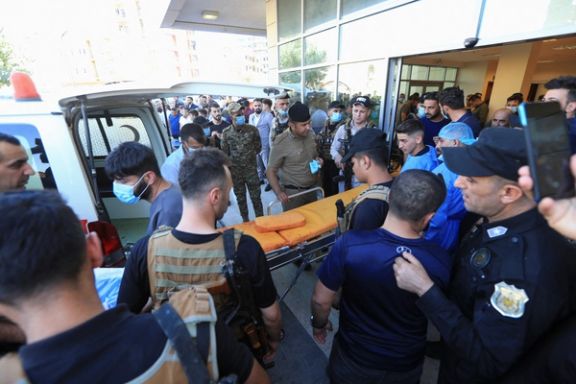
Turkey refuted claims Wednesday by Iraqi state media that it had attacked a mountain resort in northern Dohuk province, killing eight and wounding another 23 people, calling it a terror act.
The "fierce artillery bombing" hit a resort in Zakho, a city on the border between Iraq's Kurdistan region and Turkey, Iraq state TV said.
Children were amongst the victims, including a 1-year-old, the Kurdish health minister said in a statement.
The attack came one day after Turkish President Recep Tayyip Erdogan held a summit meeting in Tehran with Russian and Iranian counterparts. Iran urged Turkey not to undertake a planned offensive against Kurdish areas in Syria.
Turkey's foreign ministry said Ankara was saddened to hear of the casualties in the attack and added that Turkey takes maximum care to avoid civilian casualties in its counter-terrorism operations against the outlawed Kurdistan Workers Party (PKK) militia and others.
"Turkey is ready to take every step for the truth to come out," the ministry said in a statement, adding that Turkish military operations were in line with international laws.
"We call on the Iraqi government to not make remarks influenced by the heinous terrorist organization's rhetoric and propaganda, and to engage in cooperation to uncover the perpetrators of this cruel act," it said, referring to the PKK.
Turkey regularly carries out air strikes in northern Iraq and has sent commandos to support its offensives as part of a long-running campaign in Iraq and Syria against militants of the Kurdish PKK and the Syrian Kurdish YPG militia. Ankara regards both as terrorist groups.
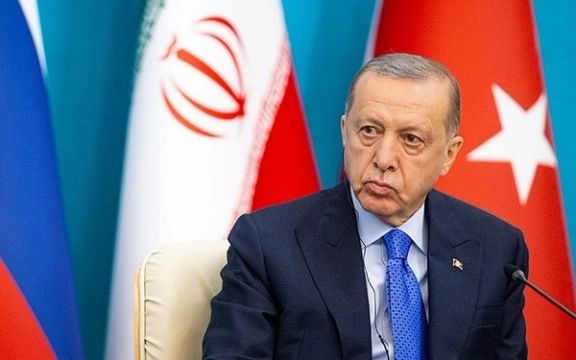
Turkey’s President Tayyip Erdogan has returned from the three-way summit in Tehran with the option of an offensive against Syrian Kurds firmly on his agenda.
Erdogan told reporters on the return flight that the leaders of Russia and Iran shared Turkey’s concern with confronting ‘terrorism.’ While Erdogan, President Vladimir Putin and Iranian leader Ali Khamenei all agreed that the United States should withdraw its troops from north-easy Syria, where they control some oil-fields, both Putin and Khamenei cautioned the Turkish president against an attack on Kurdish forces.
According to a text released by the presidential office, Erdogan continues to insist that an offensive against the main Kurdish group, the PYD (Democratic Union Party), remains possible as long as Turkey’s ‘security’ concerns are not met.
Russia, Turkey, and Iran have worked to coordinate their various interests in Syria through the Astana process, which began in 2019. But with 3.5 million refugees in Syria and a swathe along the border under Kurdish control renamed ‘Rojava,’ Erdogan reiterated Tuesday the option of establishing a ‘safe zone’ inside Syria.
The PYD is linked to the Kurdistan Workers Party (PKK), which has been active mainly in Turkey since the 1980s, and to Pejak, which operates in Iranian Kurdistan. The three share the ultimate aim of one Kurdistan uniting areas from Turkey, Iraq, Syria, and Iran.
But if Ankara and Tehran share antipathy to Kurdish autonomy, they have taken opposite sides in the Syrian war, with Iran alongside Russia backing President Bashar al-Assad and Turkey aiding mainly Sunni rebels.
The PYD has long played an on-off game with Assad, given a general Kurdish antipathy towards mainly Arab Sunni militants. Erdogan Tuesday accused the PYD of “draining” Syria petrol and selling it to Assad’s government. The PYD has also been aided by the US, ostensibly because of its role fighting the Islamic State group (Isis).
Words ‘not enough’
The trilateral summit in Tehran, which dealt with issues including food supplies arising from the Ukraine crisis, showed Erdogan’s dissatisfaction with what is becoming a settled situation in northern Syria.
“You say you understand Turkey’s concerns and we thank you for this,” Erdogan reportedly told Putin and Raisi. “But words alone are not enough.”
But the summit was also an opportunity for Erdogan to meet Putin who for the first time left the former Soviet space. The Turkish president also made Putin wait nearly one minute in an awkward situation before he appeared and greeted him for a bilateral meeting. Many saw this as a payback for all the occasions when the Kremlin boss has made Erdogan and others wait for him.
Iran’s formal position is that all concerned should respect international borders. Khamenei warned Tuesday that ‘terrorism’ in Syria was not limited to one group and that any Turkish intervention would “benefit terrorists,” destabilize the region, and “impede Syria’s political actions.” Iran may be concerned that a Turkish military operation, and the possible return to Syria of radicalized Sunni refugees, could willingly or otherwise strengthen Islamists opposed to Assad.
“We emphasised that the Syrian government must have control over all areas in the country,” Iranian President Ebrahim Raisi told a press conference following the summit.
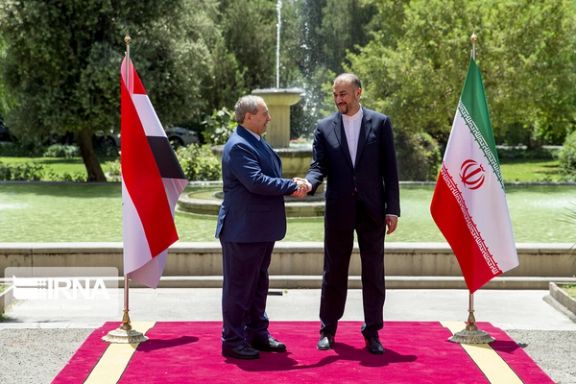
Iran’s foreign minister has called for maintaining the territorial integrity and respecting sovereignty of Syria, expressing concern about a possible Turkish military incursion into Syrian territory.
In a joint press conference with Syrian Foreign Minister Faisal Mekdad in Tehran on Wednesday, Hossein Amir-Abdolahian said that the trilateral meeting in Tehran on Tuesday sought to prevent war and militarism between Syria and Turkey and solve the issues in a political way.
Turkey’s President Recep Tayyip Erdogan and Russia’s Vladimir Putin were in Tehran July 19 for talks within the Astana mechanism, focused on the constitutional system, political transition, security and resettlement in Syria.
The Iranian FM said during the meeting with Turkey and Russia, the withdrawal and cleansing of terrorist groups from Syria was emphasized.
Describing the Astana format summit in Tehran as successful, Mekdad said "Syria is positive about the results of the trilateral summit in Tehran," thanking Iran for preparing "a balanced statement on results of the summit, reaffirming the need to preserve the territorial integrity of Syria."
"It is necessary to deprive Turkey of any pretext to invade the Syrian territory," he said, adding "Ankara's intention to create a border security zone north of Aleppo will lead to an armed conflict. We oppose Turkey's aggressive plans, Ankara's policy of Turkification and support for terrorist groups."
A few hours after their joint presser on Wednesday, Turkish warplanes and artillery attacked areas populated by tourists and villagers in Duhok, Iraqi Kurdistan, killing at least 10 people and injuring 25 others.